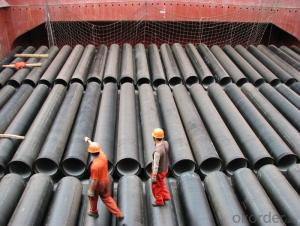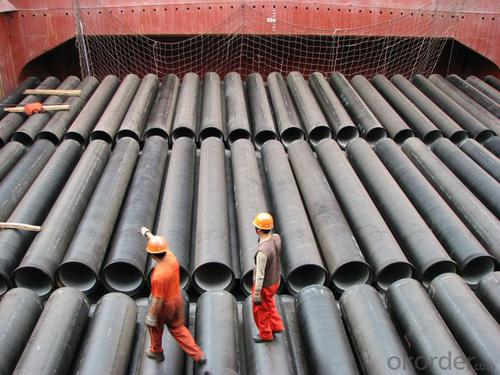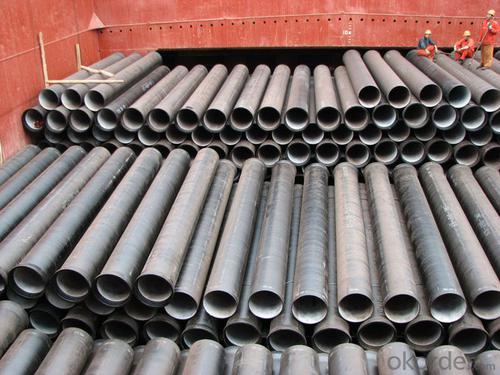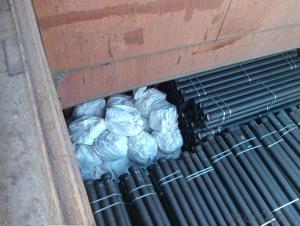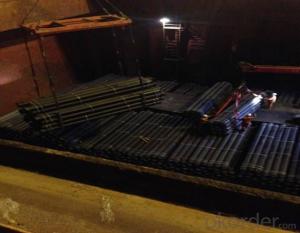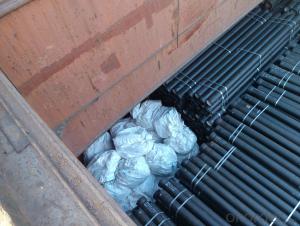DUCTILE IRON PIPE DN450 K8/C
- Loading Port:
- China Main Port
- Payment Terms:
- TT OR LC
- Min Order Qty:
- -
- Supply Capability:
- -
OKorder Service Pledge
OKorder Financial Service
You Might Also Like
Specification:
1) The standard of pipe: ISO2531:1998, K9
2) Effective length: 6m
3) Inner cement line: Portland cement line as per ISO4179
4) Zinc coating: at least 130g/m2 as per ISO8179
5) Bitumen painting: at least 70um as per ISO8179
6) With 100% quantity of NBR ring, or SBR ring, or EPDM ring as per ISO4633
7) DN80mm-800mm
8) High strength, lighter than grey iron, good corrosion resistance, no furring, small flow resistance, easy fixing, long life tome about 100 yeas
9) Produced by Hangzhou chunfeng machine
10) Checked by automatic inspection equipment
11) Composition:
Chemical composition | | | | |||
Chemical composition | Ductile Cast Iron Pipe (%) | Grey iron pipe (%) | Steel pipe (%) | | | |
C | 3.5-4.0 | 3.2-3.8 | 0.1-0.2 | | | |
Si | 1.9-2.6 | 1.4-2.2 | 0.15-0.4 | | | |
Mn | 0.15-0.45 | 0.4-0.6 | 0.3-0.6 | | | |
P | ≤0.06 | ≤0.3 | 0.02-0.03 | | | |
S | ≤0.02 | ≤0.1 | 0.02-0.03 | | | |
Mg | 0.03-0.06 |
|
| | | |
12) Feature:
Mechanical properties | | | | |||
| Ductile Cast Iron Pipe | Grey Iron Pipe | Steel Pipe | | | |
Tensile Strength(Mpa) | ≥420 | 150-260 | ≥400 | | | |
Yield Strength(Mpa) | ≥300 | No Confirmation | No Confirmation | | | |
Bending Strength(Mpa) | ≥590 | 200-360 | ≥400 | | | |
Elongation (%) | ≥10 | Neglected | ≥18 | | | |
Brinell Hardness(HBS) | ≤230 | ≤230 | About 140 | | | |
13) T type mechanical joint
14) Packing: in bulk or container
- Q: Can ductile iron pipes be used in nuclear power plants?
- Ductile iron pipes are suitable for use in nuclear power plants due to their improved flexibility and strength compared to traditional cast iron pipes. They are known for their durability, resistance to corrosion, and ability to withstand high pressure and temperature conditions. These pipes are a reliable and robust choice for transporting water, coolant, and other fluids in nuclear power plants. However, it is crucial to consider the specific requirements and regulations of each power plant before selecting the pipe material. It is necessary to ensure proper testing, certification, and compliance with nuclear industry standards to guarantee the safe and efficient operation of the power plant.
- Q: Do ductile iron pipes require internal lining for potable water applications?
- Yes, ductile iron pipes do require internal lining for potable water applications. This is because the iron used in these pipes can react with the water and potentially contaminate it. Internal lining acts as a barrier between the water and the iron, preventing any chemical reactions and ensuring the water remains safe for consumption.
- Q: How are ductile iron pipes restrained against axial thrust forces?
- Ductile iron pipes are typically restrained against axial thrust forces through the use of various mechanical joint systems. These joints, such as the push-on joint or the restrained joint, provide a secure connection between the pipes, preventing movement and ensuring structural integrity. Additionally, methods like concrete thrust blocks or anchor blocks are often used to further restrain the pipes and counteract any axial thrust forces that may be exerted on them.
- Q: Can ductile iron pipe be used for chemical processing plant applications?
- Yes, ductile iron pipe can be used for chemical processing plant applications. It is durable, corrosion-resistant, and has high tensile strength, making it suitable for transporting various chemicals and fluids in such environments. Additionally, its flexibility and ease of installation make it a practical choice for piping systems in chemical processing plants.
- Q: How does ductile iron pipe perform in areas with high soil movement?
- Ductile iron pipe is known for its strength, durability, and flexibility, making it an ideal choice for areas with high soil movement. Unlike other types of piping materials, such as PVC or concrete, ductile iron pipe has the ability to withstand significant ground shifting without experiencing catastrophic failure. The inherent strength of ductile iron pipe allows it to resist the external forces exerted by soil movement, such as settlement, lateral movement, or ground heave. Its high tensile strength and ability to withstand bending stresses make it less susceptible to cracks, fractures, or leaks, ensuring the integrity of the pipeline system. Furthermore, ductile iron pipe has excellent deflection capabilities, meaning it can flex and accommodate ground movement without breaking. This flexural capacity enables the pipe to distribute the stress caused by soil movement along its length, reducing the concentration of forces at any specific point. In areas with high soil movement, ductile iron pipe also benefits from its corrosion resistance properties. The pipe is typically coated with a protective layer, such as cement-mortar lining or polyethylene encasement, which acts as a barrier against corrosive elements present in the soil. This protective coating helps to prevent damage and deterioration, ensuring the longevity and performance of the pipe even in challenging soil conditions. Overall, ductile iron pipe is highly recommended for areas with high soil movement due to its superior strength, flexibility, and corrosion resistance. Its ability to withstand ground shifting and distribute stress makes it a reliable choice for long-term performance and minimal maintenance requirements.
- Q: Are ductile iron pipes suitable for gravity flow applications?
- Yes, ductile iron pipes are suitable for gravity flow applications. Ductile iron is a strong and durable material that can withstand the weight of the water and solid waste flowing through the pipes without any issues. It has high tensile strength and can resist damage from external forces such as soil movement or heavy traffic loads. Additionally, ductile iron pipes have smooth inner surfaces that promote efficient flow and minimize friction losses. They are also resistant to corrosion and can last for decades without requiring frequent maintenance or replacement. Overall, ductile iron pipes are a reliable choice for gravity flow applications due to their strength, durability, and resistance to various environmental factors.
- Q: Can ductile iron pipes be used for underground water treatment systems?
- Yes, ductile iron pipes can be used for underground water treatment systems. Ductile iron pipes are known for their strength and durability, making them suitable for various applications, including underground water treatment systems. These pipes are resistant to corrosion, making them ideal for transporting water, even in harsh underground environments. Additionally, ductile iron pipes have a high load-bearing capacity, allowing them to withstand the pressure and weight of the soil above. They are also versatile and can be easily installed and maintained, making them a practical choice for underground water treatment systems.
- Q: Can ductile iron pipes be used for irrigation of golf courses?
- Certainly, ductile iron pipes are applicable for the irrigation of golf courses. Renowned for their durability, strength, and resistance to corrosion, these pipes are suitable for a wide range of uses, including irrigation systems. They possess the ability to endure high-pressure water flow and are less prone to cracking or breaking when compared to alternative materials. Moreover, ductile iron pipes boast an extended lifespan, minimizing the necessity for frequent maintenance or replacement. Consequently, they represent a dependable option for the irrigation of golf courses, where a continuous and efficient water supply is imperative for sustaining healthy turf and landscaping.
- Q: Can ductile iron pipes be used for underground chemical transport systems?
- No, ductile iron pipes are not suitable for underground chemical transport systems as they are prone to corrosion and may react with certain chemicals, leading to potential leaks and contamination.
- Q: Can ductile iron pipes be used for firefighting systems?
- Yes, ductile iron pipes can be used for firefighting systems. Ductile iron is a strong and durable material that can withstand high pressures and extreme temperatures, making it suitable for transporting water in firefighting systems. Its ability to resist corrosion and withstand external loads also ensures the long-term reliability and performance of the pipes. Additionally, ductile iron pipes have excellent fire resistance properties, as they do not burn, emit toxic fumes, or contribute to the spread of fire. Therefore, ductile iron pipes are a reliable and commonly used choice for firefighting systems due to their strength, durability, and fire resistance.
Send your message to us
DUCTILE IRON PIPE DN450 K8/C
- Loading Port:
- China Main Port
- Payment Terms:
- TT OR LC
- Min Order Qty:
- -
- Supply Capability:
- -
OKorder Service Pledge
OKorder Financial Service
Similar products
Hot products
Hot Searches
Related keywords
